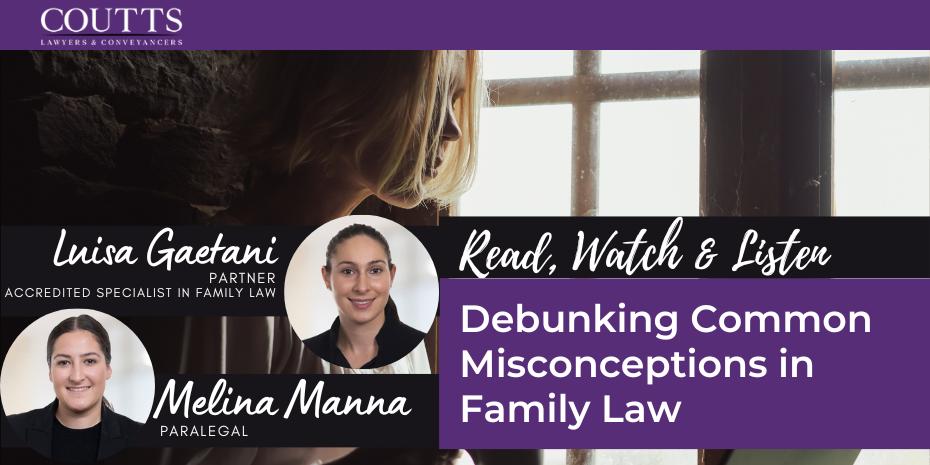We’ve Got You Covered
Coutts offers expert legal representation for individuals dealing with Property Settlements After Seperation. Our dedicated team includes an Accredited Family Law Specialist who is highly experienced in handling the intricacies of Family Law cases. We understand the sensitivity and complexity of Family Law matters, and we are committed to protecting the rights and well-being of our clients with compassion and precision.

Luisa Gaetani
Partner & Accredited Family Law Specialist
Book Your Property Settlements Consultation Now
Property Settlements After Separation
Following the breakdown of a marriage or de facto relationship, all parties need to consider how they are going to divide their property. Coutts provides legal advice and assistance in relation to asset division, spousal maintenance and superannuation splitting. Where an agreement for property division has been reached, we assist our clients in formalising this process, by way of, filing consent orders in the Federal Circuit and Family Court of Australia or the drafting and execution of a Binding Financial Agreement. Finalising the property settlement process by way of Consent Orders or a Binding Financial Agreement may allow a party (in the event of a transfer of real property into their sole name) to be exempt from payment of Stamp Duty.
Asset Division
In a property settlement, the definition of ‘property’ includes a wide range of assets, such as the family home, investment properties, savings and investment accounts, shares, superannuation, and vehicles including but not limited to cars, motorcycles, caravans, boats, business interests and at times, even inheritances. It also considers any liabilities or debts that either party may have.
The Court has adopted a 4-step approach to resolving family law property matters.
Identifying the property pool
The first, and arguably the most important step, is to accurately identify the property pool of the parties. This step involves identifying and valuing all assets of the relationship, regardless of whether they are held in the sole name of one party, or jointly. At this stage, both parties are required to provide full and frank financial disclosure to enable both sides to accurately identify, and value, the property pool. Financial disclosure documents include bank statements, pay slips, tax returns, superannuation statements, property valuations and where one party owns or has an interest in a business, all financial documents in relation to that business.
Contributions
The Court then considers the contributions of each party at the beginning of the relationship, throughout the relationship, and since separation. Contributions that are considered relevant include financial, non-financial and homemaker/caretaker duties.
Financial contributions that are considered include an evaluation of whether either party owned property of a significant value at the commencement of the relationship, whether one party made higher financial contributions throughout the relationship or any special contributions where one party received an inheritance or lump sum payment.
Non-financial contributions encompass the circumstance where one party has made significant improvements to the financial assets of the party. For example, a party who renovated the former matrimonial home undertaking all labour on their own, will be considered to have made a significant non-financial contribution. The Court also takes into consideration the contribution of each party as homemaker and caretaker for any children of the relationship. Where the contributions of the parties are not equal, this may result in an adjustment of the property pool in favour of one party.
Future Needs
The Court also takes into account the future needs of each party and the effect that the property settlement will have on these needs. Some examples of considerations include the age of the parties, the health of the parties, the income earning capacity of each party, which party will have the majority care of the Children and whether the Children have any specific future needs as well.
Fair and equitable
Finally, before deciding whether to alter the property interests of the parties, the Court will consider whether the proposed arrangement is fair and equitable in the circumstances.
Spousal Maintenance
In some cases, a spouse may be entitled to receive spousal maintenance. Spousal maintenance is provided for in the Family Law Act 1975 under Section 72 which states that the test as to whether spousal maintenance is applicable is as follows:
- If one party is unable to support themselves, whether because they have the care of a child of the marriage under 18 or because they are unable to obtain gainful employment by reason of age, physical or mental incapacity or any other reason; and
- The other party is reasonably able to pay spousal maintenance
If the test can be satisfied, then the party able to pay spousal maintenance is liable.
What to Expect with Coutts Lawyers
Step 1: Initial Contact
Reach out to Coutts Lawyers via our website, phone, or in person. Briefly describe your matter.
Step 2: Consultation Appointment
Schedule and attend a meeting with a Coutts lawyer discuss the specifics of your matter and desired outcomes.
Step 3: Information & Legal Advice
Share all related documents and information. Your lawyer will review everything, clarify aspects as needed, and then advise on the best action course.
Step 4: Action Plan Development
Based on the advice, an appropriate action plan will be formulated. This may involve communication, documentation processes, or further legal steps.
Step 5: Implementation
Execute the action plan, addressing a range of legal scenarios as necessary.
Step 6: Resolution & Closure
Navigate towards a resolution, with the path determined by the nature of the matter. Your Lawyer will outline any final actions or considerations.
Book Your Property Settlements Consultation Now
Introducing Luisa
Your Compassionate Lawyer
Meet Luisa, a Partner at Coutts Lawyers & Conveyancers, and an Accredited Family Law specialist. Luisa is the head of our esteemed Family Law team. Boasting over a decade of expertise, Luisa blends sensitivity with practicality, forging deep connections and trust with her clients. Her reputation as a foremost authority in Criminal and Family law is well-deserved.


Connect with Luisa Today
Multi Award-Winning
Law Firm

Property Settlements After Separation FAQ’s
Property settlement after separation involves the division of assets and properties following the breakdown of a marriage or de facto relationship. This process includes asset division, spousal maintenance, and superannuation splitting.
In a property settlement, ‘property’ refers to a broad range of assets, including the family home, investment properties, savings and investment accounts, shares, superannuation, vehicles/vessels like cars, motorcycles, caravans, boats, and business interests. It can also sometimes include inheritances. The term also encompasses any liabilities or debts that either party may have.
The Court adopts a 4-step approach to resolve family law property matters:
- Identifying the property pool: This involves identifying and valuing all assets of the relationship, whether held jointly or in the sole name of one party.
- Assessing Contributions: The court assesses each party’s contributions at the beginning, throughout, and since separation, including financial, non-financial, and homemaker/caretaker duties.
- Considering Future Needs: The court considers the age, health, income-earning capacity of each party, care of children, and other future needs.
- Ensuring Fair and Equitable Distribution: Finally, the Court assesses whether the proposed arrangement is fair and equitable in the circumstances.
Spousal maintenance is where one spouse may be required to financially support the other if one party is unable to support themselves due to having the care of a child of the marriage, being unable to obtain gainful employment because of age, physical or mental incapacity, or any other reason, and the other party is reasonably able to pay spousal maintenance.
Coutts’ Family Law team has extensive experience in negotiating financial settlements and offers comprehensive advice and assistance in all aspects of property settlement. Our team strives to achieve outcomes that are in the client’s best interests and are fair and equitable.
Download your FREE Family Law Guide!



